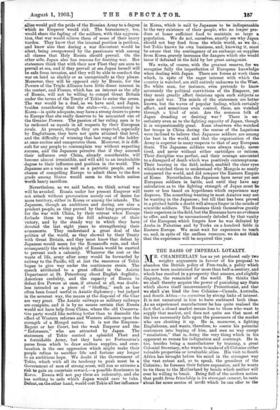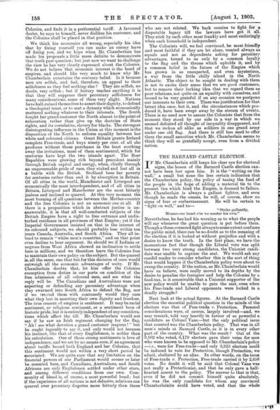THE BASIS OF IMPERIAL LOYALTY.
MR. CHAMBERLAIN has as yet produced only two weighty argunients in favour of his proposaFto abandon the British policy of Free-trade, a policy which has now been maintained for more than half-a-century, and which has resulted in a prosperity that amazes, and slightly disgusts, the remainder of the world. He thinks that we shall thereby acquire the power of punishing any State which shows itself inconveniently Protectionist, and that we shall also bind the free Colonies—Canada, Australia, and South Africa—to ourselves by strong links of interest. It is not unnatural in him to have embraced both ideas. As an experienced manufacturer he has quite realised the fact that a closed market means loss to those who want to supply that market, and does not quite see that most of the loss necessarily falls upon the possessors of the market who are shutting it up. He is, moreover, a fighting Englishman, and wants, therefore, to coerce his potential customers into buying of him, and sees no way except "retaliation," that is, doing the very thing which in his opponent so rouses his indignation and contempt. He is, too, besides being a manufacturer by 'training, a great Colonial Secretary, who wants to make of all Colonies either valuable properties or invaluable allies. His visit to South Africa has brought before his mind in the strongest way the vast extent and, so to speak, the grandeur of the Colonies ; he foresees their future expansion, and he wants to tie them to the Motherland by bonds which neither will ever be willing to break. Being full of the modern notion that profit from friendship is its strongest cement, he casts about for some source of profit which he can offer to the Colonies, and finds it in a preferential tariff. A favoured dealer, he says to himself, never dislikes his customer, and the Colonies shall be placed in that position.
. We think his economics all wrong, especially his idea that by fining yourself you can make an enemy leave off fining you, and we hope when Mr. Chamberlain has made his proposals a little more definite to demonstrate that truth past question; but just now we want to challenge the view he has very clearly expressed about the Colonies. We do not believe that economic interest is the bond of empires, and should like very much to know why Mr. Chamberlain entertains the contrary belief.. Is it because men are selfish, and feel, therefore, an appeal to their selfishness as they feel nothing else ? They are selfish, no doubt, very selfish ; but if history teaches anything it is that they will suppress their pecuniary selfishness for many considerations, some of them very slight. Nations have half-ruined themselves to assert their dignity, to defend a theological tenet, or to seat a dynasty which economically mattered nothing whatever to their interests. The South fought her grand customer the North almost to the point of exhaustion rather than give up the doctrine of State rights, and its correlative, slavery for blacks. The strongest disintegrating influence in the Union at this moment is the disposition of the North to enforce equality between her white and coloured citizens. Great Britain grants Ireland complete Free-trade, and buys ninety per cent. of all she produces without those purchases in the least soothing away the irritations, most of them sentimental, which for centuries have kept the two islands apart. The Boer Republics were growing rich beyond precedent mainly through British capital and energy, when, chiefly through an ungovernable pride of race, they staked and lost all in a battle with the British. Scotland bore her poverty for centuries rather than end it by absorption in Britain. Of all cities in the world, Manchester and Liverpool are economically the most interdependent, and of all cities in Britain, Liverpool and Manchester are the most bitterly jealous and inclined to quarrel. At this very moment the post burning of all questions between the Mother-country and the free Colonies is not an economic one at all. If there is a proposition which in abstract justice is un- answerable, it is that all well-conducted subjects of the British Empire have a right to free entrance and undis- turbed residence in all provinces of that Empire; yet if the Imperial Government insisted on that in the interest of its coloured subjects, we should probably lose within ten years Canada, Australia, and South Africa. They all in- tend to remain "white men's countries," and on that point even decline to hear argument. So should we if Indians or negroes from West Africa showed an inclination to settle here in millions, and we therefore leave the Colonies free to maintain their own policy on the subject. But the quarrel is, all the same, one that but for this decision of ours would outweigh all the economic advantages of unity. If Mr. Chamberlain doubts that, let him offer the Colonies exemption from duties in our ports on condition of the free admission of all coloured men, and see what the reply will be. The Canadians and Australians were not expecting or defending any pecuniary advantage when they swarmed into South Africa to defend the flag, nor if we tre tted them with contumely would they care what they lost in asserting their own dignity and freedom. The true cement of empires is sentiment. It may be racial sentiment, or religious sentiment, or a sentiment born of historic pride, but it is entirely independent of any considera- tions which affect the till. Mr. Chamberlain would not say if he saw an Irish regiment charging for the flag, " Ah ! see what devotion a grand customer Inspires ! " but he ought logically to say it, and only would not because his instinct, like that of every Englishman, is nobler than his calculation. One of those strong sentiments is love of independence, and we are by no means sure, if an agreement about tariffs bound both England and her Colonies, that this sentiment Would not within a very short period be excoriated. We are quite sure that any limitation on the financial powers of our Parliament would sooner or later be resented here, and Canadians, Australians, and South Africans are only Englishmen settled under other stars, and among different conditions from our own. Com- munity of blood is, of course, a most powerful bond ; but if the experience of all nations is not delusive, relations can quarrel over pecuniary disputes more bitterly than those who are not related. We back cousins to fight, for a disputable legacy till the lawyers have got it all. They stick by each other most frankly and most enduringly when each household is independent. The Colonists will, we feel convinced, be most friendly and most faithful if they are let alone, treated always as equals and not as dependents asking for pecuniary advantages, bound to us only by a common loyalty to the flag and the throne which upholds it, and by a common belief in the future of the Empire which has grown in so unexpected, and even mysterious, a way from the little chilly island in the North Atlantic. The object to be sought in dealing with them is not to excite their sense that we are good customers, but to remove their lurking idea that we regard them as poor relations, not quite on an equality with ourselves, and bound to be very grateful if on any occasion we postpone our interests to their own. There was justification for that latent idea once, but it, and the circumstances which pro- duced it, have been swept away by the stream of events. There is no need now to assure the Colonists that from the moment they stood by our side in a war in which we seemed defeated all thought of inequality disappeared, and. that we reckon all alike as soldiers in one grand army under one old flag. And there is still less need to offer them the small annuities which Mr. Chamberlain seems to think they will so gratefully accept, even from a divided nation.







































 Previous page
Previous page